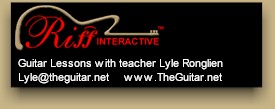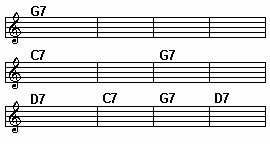Scroll through the lesson and click on notation/video/audio links to load the interactive players.
Please subscribe to get full access to all lessons for only $7.95/month PLUS 1 week free trial.

Riff Interactive lessons are
LESS expensive and
MORE interactive than alternatives!
More Info
|
|

Blues Guitar For
Beginners
Lesson 7
Lyle: The scale used the most in
Blues is the Minor Blues scale:
Lyle:
You'll be working in the key of G against this 12 bar 1 - 4 - 5
progression:
chord
chart

Lyle:
Bending notes for the Blues Beginner can be tricky. Here are the cool notes you
can bend inside the G minor blues scale:
Lyle: To help you practice bending notes, first
play a "target tone", then bend to it:
Lyle:
You don't use the tip of your finger to bend a note, you use more of the flat
part of it.
Lyle: Blues solo riffs use lots of bends and
vibrato.
JohnG:
I have a hard time with vibrato
Lyle: Wiggle that string slow and fast to create
a smooth vibrato.
JohnG: Is vibrato developed with a finger motion or a
hand/wrist motion?
Lyle: Either way.
Lyle: The solo in the lesson sample was is made
from 6 little blues riffs made from the Gm Blues scale.
Lyle: You can play your guitar with a clean sound
or overdrive sound.
Lyle: Watch the video clips to see my hand make
the vibratos.
Lyle: Here's riff 1:
JohnG: I notice
that you create bends in that example by both "pulling" and "pushing" the
string.
Lyle: Notice there are two different bends in
riff 1, a whole step (2 frets) and a 1/4 step bend (slight).
Lyle:
Some strings you can both push and pull the string when bending. The 1st and 2nd
strings can only be pushed up towards
you.
Lyle: Here's a few variations of riff
1:
JohnG: This may
be a dumb question, but apart from the strings where it can only go one way, how
do you know which way is the best way to bend?
Lyle: Which ever way works for
you.
slinger:
Hard to make a full bend on an
acoustic. ouch!
Lyle: Now try playing riff 1 against the jam
track. Keep playing it over and over through the whole jam track. Try using the
alternates too. Here's a video example:
Lyle:
Let's move on to the other riffs from the lesson sample solo. Here's your next
riff:
Lyle:
The third note that bends up a 1/2 step is bending to the flatted 5th, also
known as the blues note within the
scale.
Lyle: The next riff "walks" down and past the
blues note.
Lyle:
Real simple riffs, but they sound good when you add the bends and
vibratos.
Lyle: Next is a variation of the last
riff:
Lyle:
The next riff skips the 2nd string and jumps right to the flatted 5th (3rd
string, 6th fret):
Lyle: My
favorite part of that riff is the slight bend (3rd string, 3rd
fret).
JohnG:
Yep - that quartertone bend really gives it an unmistakable blues
flavor.
radica:
I keep forgetting that you Can skip strings. I get so robotic in the
scale.
Lyle: The last riff uses the whole
scale:
Lyle: Now you're ready to put all 6 of these
riffs together to make a solo just like in the lesson sample. Here you
go:
Lyle:
Your goal is to be able to play the whole solo with the jam
track.
Lyle: First loop the TAB player and play along to
the TAB. Once you have memorized it, try playing along to the looping jam
track.
radica:
It is a fun riff to play over the track Thanks!
Lyle: Thanks everyone for coming to the class
tonight. I hope you're jamming hard on these riffs! See you at the next lesson!
|
<< load notation from left
|
|
<< load audio from left
|
<< load audio from left
|